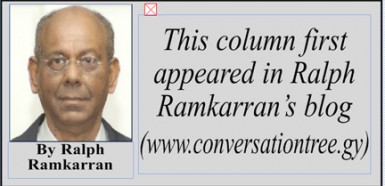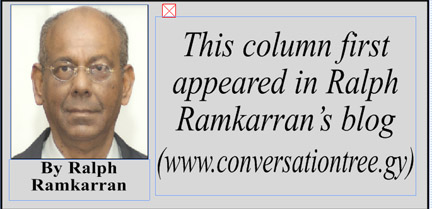The Peoples’ National Congress (PNC) government nationalised the Demerara Bauxite Company in 1971. At that time article 8 of the Constitution of Guyana provided for the payment of “reasonable” compensation. The Bauxite Nationalisation Act of 1971 amended “reasonable” to give constitutional validity to the nationalization.
At that time the PNC did not have a two-thirds majority in the National Assembly, which is required for legislation amending certain provisions of the constitution. It therefore required the support of the Peoples’ Progressive Party (PPP) to pass the act. The PPP was a fervent supporter of the nationalisation of the ‘commanding heights’ of the economy based on strong, “patriotic,” ideological convictions. Yet the PPP demanded in return a quid pro quo – an office for the Leader of the Opposition – to which the PNC Government acceded.
A similar situation occurred in 1976. In that year Bookers was nationalised. The biggest prize was the sugar industry, which was close to the heart of the PPP. In return for the support of the PPP, although by then the PNC had taken a two-thirds majority in the National Assembly, Cheddi Jagan demanded equipment and furnishings for the Office of the Leader of the Opposition. In fact, there was hardly a time when Cheddi Jagan met Forbes Burnham that he did not seek or demand political concessions – quid pro quo – for anything the PNC government wanted, though most times unsuccessfully.
 The Seward Lobby became famous during the American Civil War in the effort to obtain a two-thirds majority for the passage of the Thirteenth Amendment to abolish slavery. The work of the lobby was depicted in the Stephen Spielberg film, Lincoln, although it is said to have been exaggerated, no doubt for dramatic effect. The three lobbyists employed by Secretary of State, William Seward, allegedly bought Democratic votes with cash and jobs even though doubt has been expressed as to their importance in securing the two-thirds majority. Lincoln himself, by then known to be a selfless man of tremendous integrity, was forced to dissemble in order to prevent the defeat of the amendment. On the day of voting in the House of Representatives, a rumour spread that representatives of the Confederate Government were on their way to Washington for negotiations. If true, Democrats would not have supported the amendment. The representatives were indeed on their way to meet Lincoln, but not in Washington. Lincoln issued a statement to the effect that as far as he knew no representatives were on their way to Washington. The Thirteenth Amendment obtained the support of a two-thirds majority. It speeded up the end of the war, as Lincoln believed it would, after the loss of 600,000 plus lives. Quid pro quo negotiations, ‘horse trading,’ some would call it, dominates US and worldwide politics to this day.
The Seward Lobby became famous during the American Civil War in the effort to obtain a two-thirds majority for the passage of the Thirteenth Amendment to abolish slavery. The work of the lobby was depicted in the Stephen Spielberg film, Lincoln, although it is said to have been exaggerated, no doubt for dramatic effect. The three lobbyists employed by Secretary of State, William Seward, allegedly bought Democratic votes with cash and jobs even though doubt has been expressed as to their importance in securing the two-thirds majority. Lincoln himself, by then known to be a selfless man of tremendous integrity, was forced to dissemble in order to prevent the defeat of the amendment. On the day of voting in the House of Representatives, a rumour spread that representatives of the Confederate Government were on their way to Washington for negotiations. If true, Democrats would not have supported the amendment. The representatives were indeed on their way to meet Lincoln, but not in Washington. Lincoln issued a statement to the effect that as far as he knew no representatives were on their way to Washington. The Thirteenth Amendment obtained the support of a two-thirds majority. It speeded up the end of the war, as Lincoln believed it would, after the loss of 600,000 plus lives. Quid pro quo negotiations, ‘horse trading,’ some would call it, dominates US and worldwide politics to this day.
Negotiations and compromise are the lifeblood of democratic governance and politics. They are sometimes ugly and often painful but are necessary in every country, moreso in those where the executive and legislature are controlled by opposing political parties, as in Guyana and the United States.
The call to patriotism, in response to the demand for a quid pro quo, is becoming a constant refrain as if to suggest that everything the government puts on the table the opposition must support because it is the patriotic thing to do. However, it is naïve to believe that hollow calls to patriotism and the adoption of high sounding principles about quid pro quo, when Cheddi Jagan himself was a master of that process, will cut any ice, especially since the opposition has little by way of constructive achievements to show its supporters.
The Government of Guyana has more than once demonstrated its belief that as the executive, it is entitled to legislative support from an opposition which is alleged to have not a real, but only a ‘technical’ majority. The fact that this weird theory does not exist and flies in the face of reality does not seem to matter, as the government plods on doggedly in the face of mounting problems, the latest being the catastrophic drop in gold declaration.
While doing so the PPP demands that the opposition must prove itself by confidence building measures if it is interested in shared governance. What are these? Support everything it has not supported in the National Assembly in the past two-and-a-half years! Also, give the PPP the deputy speakership and greater weightage in the sectoral committees! After trust and confidence is established by the opposition’s concessions, only then will the government consider shared governance.
This is not the first time this promise has been made. President Jagdeo announced on February 11, 2003: “The PPP/C proposes the implementation of all constitutional reforms as an immediate measure to building trust and to further enhance inclusive governance… In an environment created by deepening trust and confidence, further arrangements for inclusive governance can result after consultation with our constituents and the electorate.” This promise was for ‘further arrangements’ after constitutional reforms, not as a part of those reforms. The constitutional reforms were concluded with the support of the PNCR. No ‘further arrangements’ resulted.
The revered guru, Sai Baba, is reported to have advised his followers: “Give all and take nothing.” Governance in Guyana appears to rely on the principle: ‘Take all and give nothing.’






